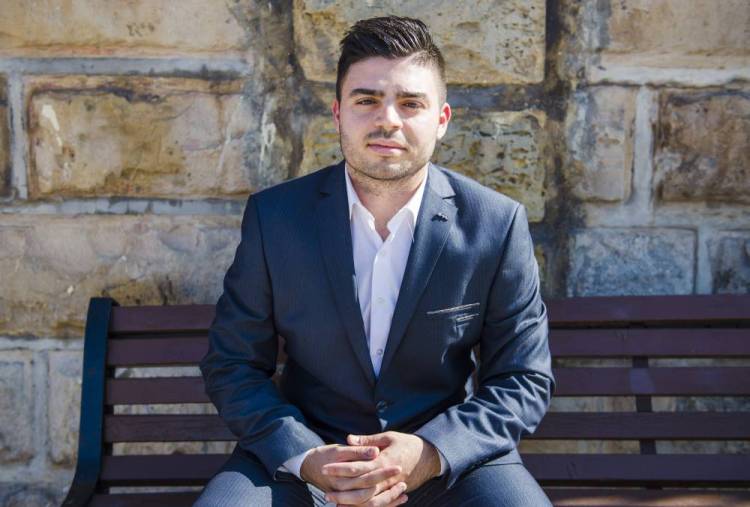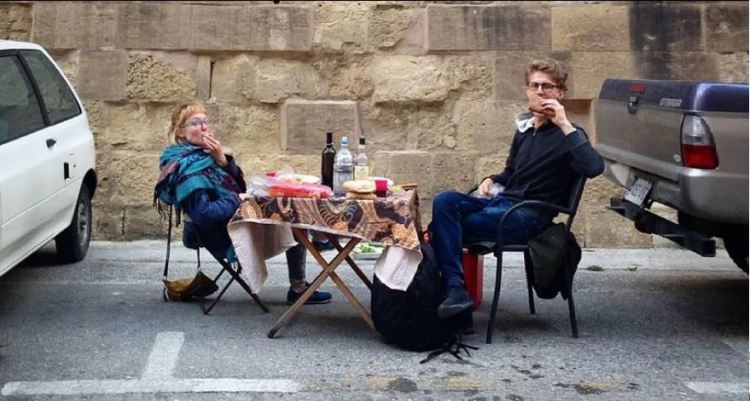Perhaps the true emotional climax of Rian Johnson’s rollicking, wildly entertaining and fiercely intelligent murder mystery Knives Out (2019) comes midway through its final act, after Marta Cabrera (Ana de Armas), the beleaguered nurse to the recently deceased (and filthy rich) crime novelist Harlan Thrombey, is all but forced to apologetically prostrate herself in front of his sneering, sniveling and money-grubbing heirs.
A South American migrant whose mother is undocumented – that the Thrombey heirs and in-laws consistently getting her nationality wrong during police interrogations is one of the film’s best running gags; some say she’s from Ecuador, others from Paraguay – she does her best to placate the spoiled brood after a plot-important (and therefore spoilery) development flips the power dynamic between her and her erstwhile employers, edging the proverbial knives out of the rich family’s sheathes and placing the perennially good-hearted Marta in a thoroughly uncomfortable position.
Keen to show that she has no intention of offending or otherwise discomfiting the Thrombeys in light of this new development, Marta insists on pointing out how the family has been “good to [her]” by giving her employment and at least ostensibly making her feel part of the privileged Thrombey fold while she took care of their patriarch in his dotage.
The family takes this as a given, never for a second considering that there could have been any ‘decent’ alternative way for all of this to pan out. Being a migrant, her inherent abjection and lack of agency is the default setting she’s expected to operate under. Though nominally valued, the work she does for the family is not nearly enough to grant her anything resembling full personhood, and anything that crosses the line of that rigidly defined master and servant relationship is to be apologised for profusely, or else.

Keeping up with the Thrombeys: After Harlan Thrombey (centre) is found dead in an apparent suicide, the rest of his family decend into a not-so-petty extended squabble over the spoils
It is at this point that Benoit Blanc (Daniel Craig) – Johnson’s wonderfully conceived riposte to the Sherlock Holmes/Hercule Poirot archetype, gleefully brought to life by a relaxed and game post-Bond Craig – crosses a line of his own. Lifting the veil of cold calculated deductive reasoning that has so far been his modus operandi (and that of his literary and filmic antecedents in the detective genre), he interrupts Marta by giving in to a bubbling ethical indignation:
“Excuse me. You have not been good to her. You have all treated her like shit […] You’re a pack of bloody vultures at the feast, but you’re not getting bailed out, not this time.”
We can make much out of Blanc being something of a ‘white knight’ in this situation, also pointing out that most migrants out there do not in fact have such figures bursting through to speak out in their favour when things get really tough. But within the context of the film, Blanc’s outburst serves as a welcome bit of catharsis. How much of this misguided, undeserved and disingenuous shit are we going to take, and for how long?
Disgraced former tourism and energy minister Konrad Mizzi recently evoked something of a similar reaction in local quarters after posting an incendiary Facebook post following a literally incendiary event in Marsa.

“You fled your country. We saved you from drowning. We gave you shelter in our home. We dressed you, fed you. But now learn to respect us, our culture, our religion and the Maltese population,” Konrad Mizzi wrote on Facebook on January 8th, 2019, in the wake of a fire engulfing the Marsa Open Centre, which led to the arrest of 20 people.
Like the Thrombeys, Mizzi betrays no qualms at lumping all migrants in the same basket, with an added sting of political convenience handy to local politicians – particularly ones given the chop in the wake of shady financial dealings, who are now perhaps hoping that a new party leader will allow them to once again rise in the party ranks, previous sins washed clean as they are buoyed back into the public discourse by this recent appeal to far-right sentiment.
Mizzi does indeed expect all migrants to merely shut up and take any indignity thrown at them, except perhaps when they open their mouths to intone just how “good to them” we’ve been for allowing them the privilege of taking shelter on our island.
Never mind that the true source of the fire has yet to be determined, and never mind that this rush to condemn sits uncomfortably when compared to Mizzi’s own post-Panama political trajectory, during which we were all expected to let the legalisms that have exonerated him to speak for themselves.
Never mind that, even if the fires at the Marsa open centre are proven to have been deliberately started by migrants housed there, Mizzi’s diabolically moralistic generalisation cannot even begin to hold water: it assumes that all of the migrants there would have been in full agreement with any criminal action taking place.
And in this particular case, the notion that the migrants at the open centre should be grateful to us for ‘housing’ them is also off base: by its very definition, the open centre largely serves as a transitional space in which migrants are made to wait while their paperwork is processed and before they are given the go-ahead to either stay in the country or move elsewhere.
But apart from being an obvious and cheap attempt at garnering public support from literally the most toxic of national sources, Mizzi’s attitude is also redolent of the kind of ‘logic’ and ‘common sense’ which underpins some of the same toxicity within the migration debate. ‘We will charitably do our bit to welcome third country nationals into the country, but if they dare express anything other than adulation of even consider making minor legal infringements – infringements that we’d easily forgive among ‘our own’ – the only thing they should look forward to is swift deportation’.

Ana de Armas is Marta Cabrera in Knives Out (2019)
It is a logic that is accurately, meticulously and painfully articulated in Knives Out. In an early scene – or rather, early confessional flashback – Marta is brought in as an unwitting ‘exhibit A’ of the ‘good migrant’ by Richard (Don Johnson), as a tangible closing salvo to a family debate on Donald Trump’s heinous migration border policy (Ol’ 45 is not explicitly mentioned by name, but the correlation is impossible not to make). Conceding that ‘putting children in cages’ is a bad thing, Richard clings to legalisms:
“But I blame the parents […] for breaking the law. You’re going to hate hearing this but it’s true, America is for Americans.”
It’s at this point that Richard commands a vigilant and nervous Marta to come over, as if a walking, (barely) talking illustration of his point. Making a point to wave his polished-off cake plate at the trembling girl, to be taken away later, Richard carries on,
“Marta, your family came from Uruguay but you did it right, she did it legally, I’m saying. You work hard, and you’ll earn your share from the ground up just like dad and all of us did – Marta I bet you agree with me.”
Never mind Richard obliviousness to both Marta’s own true country of origin (something the audience itself never becomes privy to either, to be fair); the fact that Richard is also ignorant of her family’s legal status is of course the deeper cut. Once that truth is revealed – by one of the supposedly more ‘woke’ members of the Thrombey family – the information gives way to blackmail, not help from this monied and influential family. Truly, they have not been, and will insist on never being, good to her.
Many arguments in favour of existing, status quo migration policies accuse the ‘other side’ of sentimentality or misdirected compassion, of refusing to consider the rational underpinnings behind arguments like ‘America is for Americans’, ‘illegal immigrants are simply breaking the law’.
But pronouncements like Mizzi’s own are also an act of obfuscation, apart from being a vulgar attempt to piggyback on racist undercurrents in an attempt to salvage some form of political capital. In framing migration policy as little more than an act of charity, Mizzi conveniently dodges the responsibility of rigour that is crucial if one is to honestly engage with issues of such complexity.
It’s a smoke-and-mirrors exercise made possible through the mechanisms of privilege – Mizzi’s own monied background, his history as a politician which, however chequered, still garners active support from a vocal contingent of Labour supporters – and it’s also the main obstacle that Benoit Blanc faces as he attempts to crack the case he’s now facing.
Because while Marta’s part in Johnson’s serpentine plot is hardly as simple as her otherwise diminished social standing would suggest, the Thrombey’s arsenal of cash and influence goes a long way towards making the case as juicy and complex as possible, as an eleventh-hour reappearance of an absent Thrombey scion makes clear as the film transitions from the second act to its third.

Somewhere over gravity’s rainbow: Daniel Craig is Benoit Blanc
Blanc uses the title of Thomas Pynchon’s novel Gravity’s Rainbow to describe his working method to Marta – a famously impenetrable tome that neither of them have read, but whose title Blanc is partial to because,
“It describes the path of a projectile, determined by natural law. Voila, my method. I observe the facts without biases of the head or heart, I determine the arc’s path, stroll leisurely to its terminus, and the truth falls at my feet.”
Mizzi and other politicians of his ilk are in the business of putting themselves precisely in the path of the projectile, blocking a thorough examination of the truth by opening the floodgates to angry, misguided sections of the electorate who will offer them their support in the wake of such toxic battle cries.
It is a self-serving move masquerading as a beacon of wider social concern, and it precisely encapsulates the paradox of figures like Konrad Mizzi: well-oiled businessmen brought into the fold of an ascendant Labour Party and asked to deploy their technocratic skills in the interest of securing continued victory.
It’s a paradox that also came undone in the wake of a murder – that of Daphne Caruana Galizia, whose mysteries have been unravelled somewhat, but not in their entirety.












